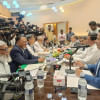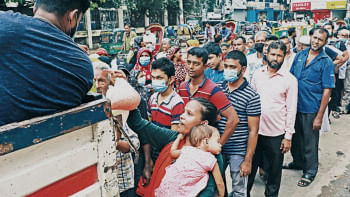Talks with consensus commission: BNP stands against floor crossing

The BNP has rejected the Constitution Reform Commission's proposal that would bar any individual from serving more than two terms as prime minister, calling it "undemocratic and unjustified".
"If the people want someone to return as prime minister after a break following two terms, that opportunity should remain. There is no logical reason to restrict it," said BNP Standing Committee member Salahuddin Ahmed.
He was speaking to reporters yesterday after discussions with the National Consensus Commission at the LD Hall of the Jatiya Sangsad Bhaban.
The meeting, held behind closed doors, marked the second day of talks aimed at reaching a consensus on proposals submitted by five reform commissions.
The BNP also reiterated its opposition to the formation of a National Constitutional Council, which it said would undermine the authority of the prime minister.
The party raised concerns over the proposed establishment of a Supreme Court Secretariat and a new mechanism to appoint judges, asserting that such reforms cannot be implemented without amending articles 95 and 116 of the constitution. These articles deal with the appointment of judges and the control and discipline of subordinate courts.
Salahuddin maintained the party's support for judicial independence, but warned that any move to introduce judicial reforms outside the constitutional framework would be unlawful.
During the talks, the BNP voiced strong reservations over the proposal to reduce the parliamentary term from five years to four.
It also objected to a proposal to change article 70 that would allow MPs to vote against their party on all matters except money bills.
Instead, the BNP suggested allowing MPs to participate in discussions -- without voting -- on issues like constitutional amendments, confidence motions, and national security.
The party disagreed with the commission's recommendation for proportional representation in a proposed upper house of parliament, insisting that any decision on a bicameral legislature must come through open debate in an elected parliament.
The BNP reiterated its support for restoring the constitutional provision that mentions "absolute trust and faith in the Almighty Allah".
On fundamental rights, Salahuddin said the state must not promise rights it cannot realistically ensure, warning that an overly broad definition could create economic burdens.
Despite major disagreements, the BNP found common ground on some issues. It agreed to incorporate the principles of equality, human dignity, and social justice -- as reflected in the Declaration of Independence -- into the constitution's preamble and fundamental principles.
The party also supported the proposal to increase the number of reserved seats for women in parliament from 50 to 100, though it recommended keeping the current system in the next general election.
The BNP called for reforms to the caretaker government system, focusing on the method of appointing the chief adviser.
Party leaders argued that a more neutral and credible appointment process is necessary to restore public trust in electoral oversight.
The party strongly emphasised reforming the Election Commission, demanding greater legal and institutional safeguards to ensure its independence and capacity to hold free and fair elections.
In addition, the BNP advocated for the strengthening of local government bodies, stressing the need for genuine decentralisation backed by sufficient resources and authority.
On judicial reforms, the party proposed separating the Appellate and High Court divisions of the Supreme Court and suggested forming a separate constitutional court to deal with constitutional matters exclusively.
Alleging that the Anti-Corruption Commission is often used for political purposes, the BNP demanded its full autonomy. Similar calls were made for the depoliticisation of the police and civil administration to ensure neutrality and professionalism in state institutions.
The party maintained that while some reforms would require constitutional amendments, many could be implemented through ordinary legislations passed by parliament.
It stressed the importance of political consensus in driving any successful reform agenda.
The meeting, which lasted from 11:00am to 5:30pm, was attended by five BNP representatives: Nazrul Islam Khan and Salahuddin Ahmed of the Standing Committee; party chairperson's adviser Md Ismail Jobiullah; lawyer Ruhul Quddus Kajol; and former secretary Abu Md Moniruzzaman Khan.
Representing the commission were its Vice-Chairman Prof Ali Riaz, Justice Md Emdadul Haque, Badiul Alam Majumdar, Iftekharuzzaman, and Safar Raj Hossain. Monir Haidar, special assistant to the chief adviser (Consensus), moderated the session.
Party sources said that while the BNP showed flexibility on minor issues, it held firm on matters of constitutional significance.
Though the party aligned with the commission on broad democratic principles, deep disagreements remain over procedural and implementation frameworks, setting the stage for further political negotiations.

 For all latest news, follow The Daily Star's Google News channel.
For all latest news, follow The Daily Star's Google News channel. 








Comments